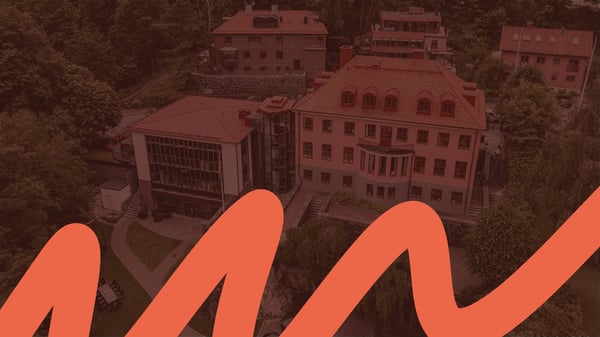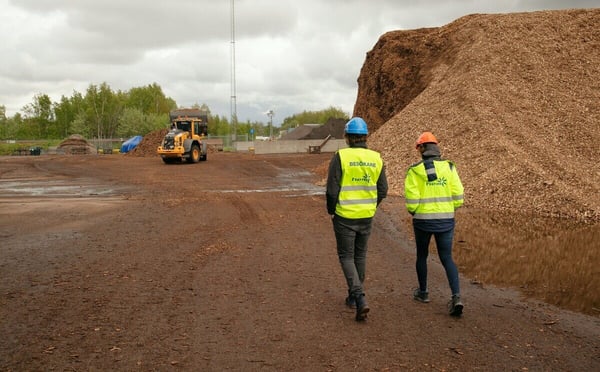Natural stone is a natural part of the cityscape. We encounter it on stairs, sidewalks, pedestrian zones, squares and roundabouts. In the walled playground, in the square by the fountain and the small footpath that winds through the park.
Despite being surrounded by natural stone, it's something most of us probably don't give much thought to, other than when it comes to kitchen worktops or paved patios. Yet the lion's share of natural stone is found in public spaces: granite, basalt, limestone, marble, slate, sandstone and many other varieties. All with their own unique properties and uses.
The Nordic region's largest supplier of natural stone
If you're in one of our big cities, chances are you have Zurface to thank for the stones that adorn our streets and squares. The Danish-Swedish company is one of our largest suppliers of natural stone, the largest in the Nordic region in fact. As a supplier to construction companies, Zurface supplies stone to Stockholm, Gothenburg and Malmö. The material comes from Sweden, from its four quarries in Denmark and imports from Europe.
For example, last year Zurface supplied 25,000 tons of stone, a figure that can be difficult to grasp. What does it mean in practice? As a guide, it's the equivalent of 60 miles of kerbstone - as long as the distance between Stockholm and Malmö.
From childhood quarries to today
With large quantities comes even greater responsibility in sustainability. It's a responsibility that Zurface fully embraces. The company is at the forefront of an increased focus on sustainability and environmental issues in an industry known for high risks. A commitment that is personified by the company's Swedish CEO Eric Waxin.
Eric has had a relationship with natural stone since childhood. Growing up on Bohus-Malmön was characterized by the proximity to the quarries. Bohus-Malmön is the site of Sweden's first stone industry, which started in 1842, when shipowner Carl August Kullgren and legendary engineer Nils Ericson were granted permission to mine stone.
- For me, the plan was to do something other than stone, says Eric. I chose a civil engineering degree, specifically as a computer engineer. But in the end, I ended up in the stone industry.
With a twinkle in his eye, Eric speculates that it might have something to do with those childhood walks by the quarries.
Now, however, his sights are set on the future, and more specifically, how he and his colleagues can help drive sustainability in an otherwise relatively conservative industry. What can they do to move the needle on sustainability?

Eric Waxin, CEO of Zurface
Eight pillars of sustainability
Like so many other things, Zurface's sustainability efforts are about living what you learn. It's a realization the company has made its own. Zurface's compliance work rests on eight cornerstones, in the form of the UN body ILO's conventions on human rights at work. The work includes tackling and combating corruption and discrimination. It is also about making demands on suppliers with whom the company cooperates, for example when it comes to ensuring freedom of association.
If we are to have a high standard, we need to make demands on both ourselves and those we work with.
- If we are to have a high standard, we need to make demands on both ourselves and those we work with. We need to be able to control what kind of stone we have. For this reason, we do not allow stone from China, because how could we ensure compliance in a dictatorship where there is no freedom of association? It may seem obvious, but this is not always the case in our industry.
As I said, our work is not limited to making demands on others, but is also about auditing ourselves. For example, Zurface produces emissions reports to map its carbon footprint. These EPD reports are now standard.
Stratsys system support - a catalyst in sustainability
The ability to set requirements and check that they are actually met runs like a red thread through sustainability work. The basis for this is a solid system support.
For Zurface, this support comes from Stratsys - more specifically from the ESG due diligence product, which helps the company to evaluate and manage risks in its value chains. The risks are divided into financial status, work environment and raw material risks.
The collaboration started several years ago when this product was still called Evaluate.
Stratsys is extremely important as a daily tool in our requirement setting towards suppliers.
- The system support has been with us for five years, ever since we started our major sustainability work. It has been and is extremely important as a daily tool in our requirements for suppliers. Thanks to ESG due diligence, we receive reminders to ensure that we have all documents in place, it is extremely clear. It's a check that didn't exist before we started working together.
In terms of raw materials, Zurface only works with stone from the Nordics and Europe. The company conducts regular site visits.
We can gather everything we need in the Stratsys solution. I can't say that we are missing anything.
- Thanks to Stratsys, we get help with our self-checks at suppliers, what are called site visits. We also work with self-assessment questionnaires, known as SAQs. And we can gather all this in the Stratsys solution. I cannot say that we are missing anything.
Concrete results on several fronts
So what has the collaboration with Stratsys contributed to Zurface? According to Eric, it has affected both their own production and their relationship with customers.
- Having Stratsys as system support has led to higher demands on our own production. It has made us ensure that we really have everything under control, in addition to obviously complying with the law. And in our relationship with our customers, we have pushed them to raise their demands on us suppliers. This is also a consequence of being able to work in a structured way thanks to Stratsys.
According to Eric, it's not just about having a system support to rely on. It has also contributed in the other direction, as a change engine:
- By working with the Stratsys model, we have managed to put a lot of pressure on our suppliers to get their act together. Which in turn has helped them to work even better with the sustainability issue.
Stratsys is a partner with whom we can grow and develop, both today and tomorrow.
- We feel incredibly satisfied with Stratsys. The solution has helped to lift both ourselves and our suppliers. Stratsys is a partner that we can grow and develop with, both today and tomorrow, Eric concludes.
If you want to know more about how Stratsys can help you in your sustainability work - contact us and we will be happy to tell you more.



